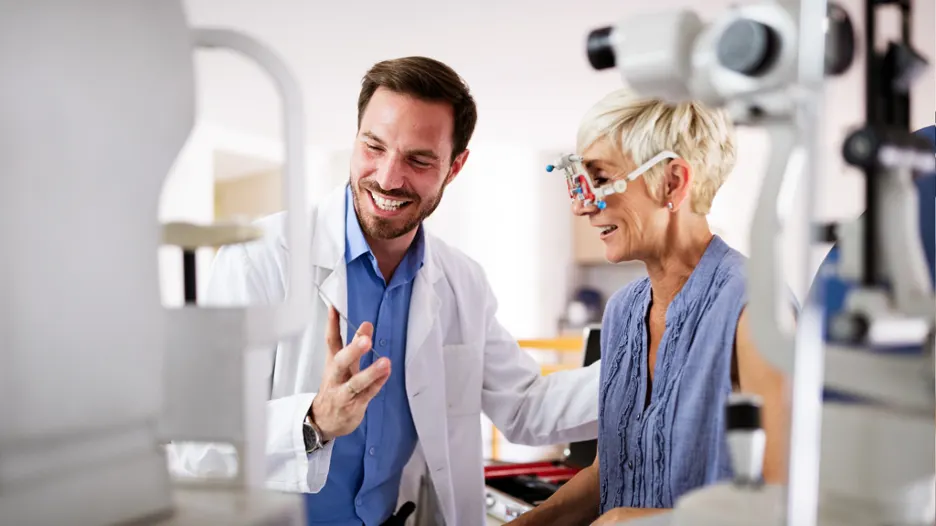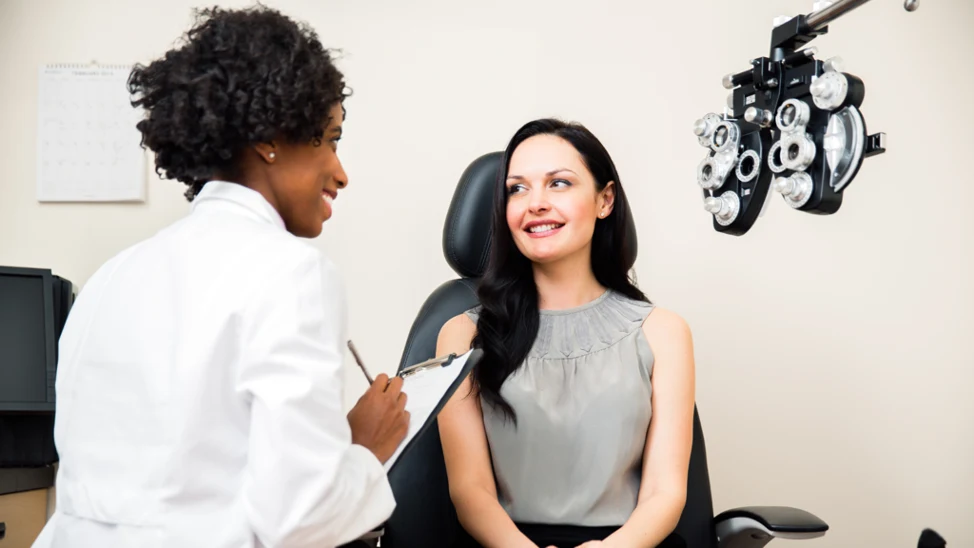When was the last time you visited your optometrist? If you’re like many people, a trip to the eye doctor can feel routine, but it’s so much more than that. Whether you wear glasses or contact lenses, have noticed vision changes, or simply want to stay ahead in preventive eye care, your eye exam is your opportunity to learn about your eye health and understand how to maintain it.
In 2025, eye care has advanced with the latest technology and treatments. Yet, many people still feel uncertain about how to maximize the benefits of their visits. It can be hard to know what to ask. After all, most of us don’t have a daily conversation about eye health, and that’s where we come in.
At LMC Optometry & Eye Care, we believe in empowering you with the knowledge to make informed decisions about your eye health. To help you prepare for your next eye exam, we’ve compiled 15 essential questions you should ask during your visit. These questions will not only provide valuable insight into your vision, but they’ll also ensure you’re staying proactive about your eye care.
1. How Is My Overall Eye Health?
Starting with a broad question gives you a comprehensive overview. Ask your optometrist about the current state of your eye health, whether there are any red flags, and if you should be monitoring any specific conditions. This is your opportunity to ask about general eye health, as well as how it connects to your lifestyle, like screen time or diet.
Tip: If your eye doctor mentions specific conditions like glaucoma or cataracts, ask for a breakdown of what to expect in the future and how to manage them.
2. Should I Be Concerned About Age-Related Vision Changes?
Vision changes are inevitable as we age, but understanding what to expect is crucial. Ask your optometrist about age-related conditions like presbyopia (difficulty seeing up close) and cataracts. The earlier you recognize these changes, the easier it will be to manage and prevent progression.
Tip: If you’re noticing blurred vision, especially while reading or looking at small objects, it may be time to start looking into reading glasses or bifocals.
3. How Often Should I Schedule Eye Exams?
Regular eye exams are essential for monitoring changes in your vision and detecting early signs of eye conditions. Your optometrist will consider your age, family history, and health conditions to suggest the right frequency for your exams. For instance, adults over 40 or individuals with chronic conditions like diabetes may need to schedule exams annually.
Tip: If you’re between 40 and 60, it’s crucial to get a comprehensive eye exam every two years to catch issues early before they develop into bigger problems.
4. Are My Current Glasses or Contact Lenses Still the Right Prescription?
If you wear glasses or contact lenses, it’s important to ensure your prescription is up to date. Ask your optometrist if there have been any changes in your vision that might require a new prescription. Many people continue wearing old prescriptions, not realizing that their vision has changed.
Tip: If you’re experiencing eye strain, headaches, or difficulty reading small print, your prescription may need an update.
5. Can You Explain the Results of My Eye Test?
Understanding the results of your eye exam is key to staying informed about your eye health. Your optometrist should explain your visual acuity, eye pressure, and any tests performed, such as a retinal scan. This clarity will help you make decisions about treatment or preventive care.
Tip: Don’t be afraid to ask for a clear explanation of any terms or results you don’t understand. The more informed you are, the better decisions you can make about your eye care.
6. What Are the Best Treatment Options for My Condition?

If you’re diagnosed with a condition like dry eye, macular degeneration, or astigmatism, ask your optometrist for a breakdown of available treatment options. With advances in eye care technologies, there may be new, more effective ways to manage or treat your condition.
Tip: Research any treatment options your optometrist suggests, so you can feel more confident in making decisions for your eye health.
7. Are There Any Lifestyle Changes I Should Make to Protect My Eyes?
Certain habits, like excessive screen time or poor diet, can harm your eye health. Ask your optometrist for recommendations on how to protect your eyes. This could involve tips like reducing screen time, wearing UV-protective sunglasses, or incorporating eye-healthy foods into your diet.
Tip: Increase your intake of vitamin A, C, and omega-3 fatty acids—foods like leafy greens, citrus fruits, and fatty fish are great for eye health.
8. How Can I Prevent Digital Eye Strain?
With more people working from home or spending hours on digital devices, digital eye strain has become a major concern. Ask your optometrist for tips on managing this condition. Your doctor may recommend blue light glasses, adjustments to your screen, or the 20-20-20 rule, where every 20 minutes, you look at something 20 feet away for 20 seconds.
Tip: Set up an ergonomic workstation with your screen at eye level to reduce neck strain and minimize glare.
9. Should I Consider LASIK or Other Vision Correction Surgeries?
If you’re tired of wearing glasses or contact lenses, LASIK or other vision correction surgeries might be an option. Ask your optometrist if you’re a candidate for LASIK, and whether the benefits outweigh the risks for your specific condition.
Tip: LASIK isn’t for everyone, so your optometrist may recommend alternatives like PRK or implantable lenses, especially if you have dry eyes or thin corneas.
10. How Can I Protect My Eyes from UV Damage?
UV rays can cause serious harm to your eyes, increasing the risk of cataracts and other eye diseases. Ask your optometrist about the best sunglasses to protect your eyes year-round. Even on cloudy days, UV rays can still damage your vision.
Tip: Look for sunglasses that offer 100% UVA and UVB protection, and always wear them while outdoors, even in winter.
11. What’s the Impact of My Health on My Eyes?
Your overall health plays a major role in your eye health. Ask how conditions like diabetes, high blood pressure, and even stress could affect your vision. Managing these conditions is essential for preserving your eye health.
Tip: If you have diabetes, ask about the best ways to monitor your eye health, as diabetes increases the risk of diabetic retinopathy.
12. How Can I Manage Dry Eyes?
Dry eye syndrome is a common condition that can cause discomfort and affect your quality of life. Ask your optometrist about the best treatments available. This could range from lubricating eye drops to advanced treatments like punctal plugs or LipiFlow.
Tip: Consider using a humidifier in dry indoor environments to help prevent dry eyes, especially during winter months.
13. Are There Any New Technologies or Treatments I Should Know About?
The world of optometry is constantly evolving, and new treatments and technologies are frequently introduced. Ask your optometrist about the latest innovations in eye care, like digital retinal imaging, Optical Coherence Tomography (OCT), or new treatments for dry eyes.
Tip: Ask about personalized treatments, like customized contact lenses or advanced surgical options, which might offer better results than traditional treatments.
14. What Can I Do to Improve My Vision Long-Term?
It’s never too early to start taking care of your eyes for the future. Ask your optometrist for long-term strategies to preserve your vision. These can include lifestyle changes like reducing screen time, eating eye-healthy foods, and wearing protective eyewear.
Tip: Take care of your eyes by scheduling regular checkups, protecting them from UV rays, and following the 20-20-20 rule to reduce digital eye strain.
15. Should I Be Concerned About Any Family History of Eye Conditions?
If you have a family history of eye diseases like glaucoma, cataracts, or macular degeneration, ask your optometrist how your family history affects your risk. This will help you take proactive steps to monitor your eye health and detect problems early.
Tip: Keep your family’s medical history updated, as this information will help your optometrist create a more tailored eye care plan for you.
Start Asking The Correct Questions To Your Optometrist Today
Your eye exam is a valuable opportunity to understand your vision health and ensure it stays sharp for years to come. By asking these 15 questions, you’ll not only gain a deeper understanding of your eye health, but you’ll also be empowered to make informed decisions that help protect your vision.
At LMC Optometry & Eye Care, we’re here to help you navigate your eye health journey, from routine exams to advanced treatments. Schedule your next eye exam today and take the first step toward a clearer, healthier future!
Take Charge of Your Eye Health Today
Don’t wait until small issues turn into big problems. Schedule your comprehensive eye exam today and ensure your vision stays clear for years to come. Book your appointment with LMC Optometry & Eye Care now!



